Interview: John Petrucci's 7 steps to prog guitar greatness
With leading disciple Misha Mansoor (Periphery)
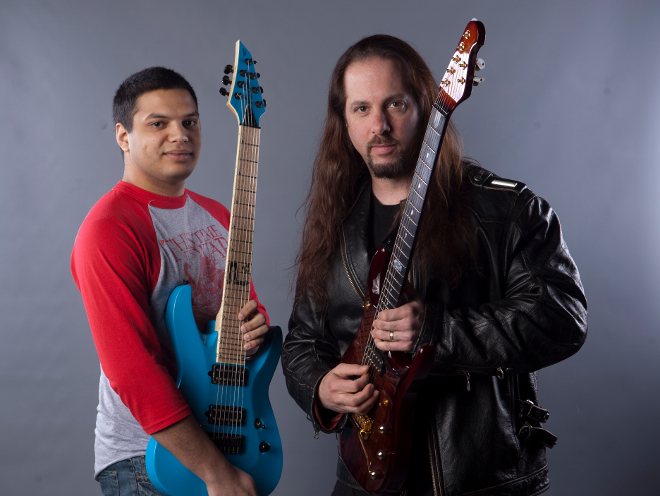
Introduction
We caught up with Dream Theater guitarist John Petrucci, or ‘Sir’, as he’s known to the team, along with his disciple and tour buddy Misha Mansoor to talk guitar heroes, technique development and how to harness the power of the internet.
Prog rock god John Petrucci is without doubt one of the most technically accomplished players in the world today. His is the kind of ‘guitar-ing’ that’s capable of ripping a hole in the time-space continuum, curing ailments and, as proven recently, selling out Wembley Arena.
Pick up Total Guitar issue 226, on sale in the US this month, for the full in-depth interview with John Petrucci and Misha Mansoor, plus a special tutorial feature on John’s ultimate warm-up routine.
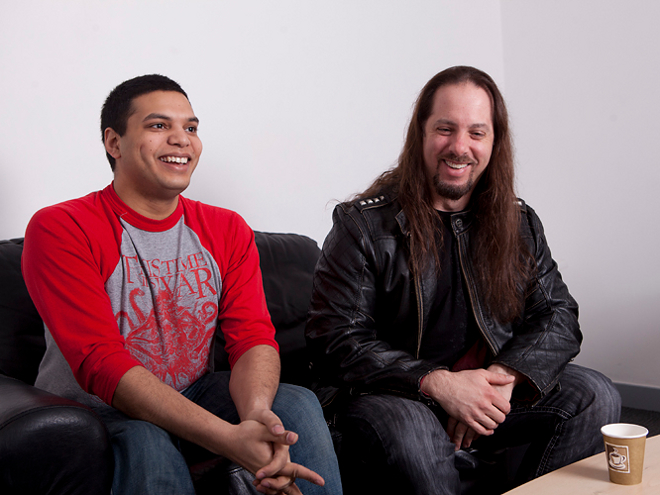
Have a hero, even if you won't be them
Everybody needs to have a hero or two when they're learning guitar: it keeps you inspired, drives you to become better and keeps your feet on the ground when you become totally mega famous...
Misha Mansoor: “When I was 17, I decided that I needed to become John Petrucci. I went out and bought a Petrucci seven-string and learned as much Dream Theater as humanly possible. I realised really fast that it was not gonna happen...”
John Petrucci: “I think emulating somebody or the path they took is actually a great way to achieve success. I did the same thing. I said, ‘Well, Steve Vai went to Berklee: I’d better go to Berklee. Randy Rhoads took his guitar to school: I’m taking my guitar to school’.
Buy Total Guitar for iPad, iPhone and iPod (US readers click here)
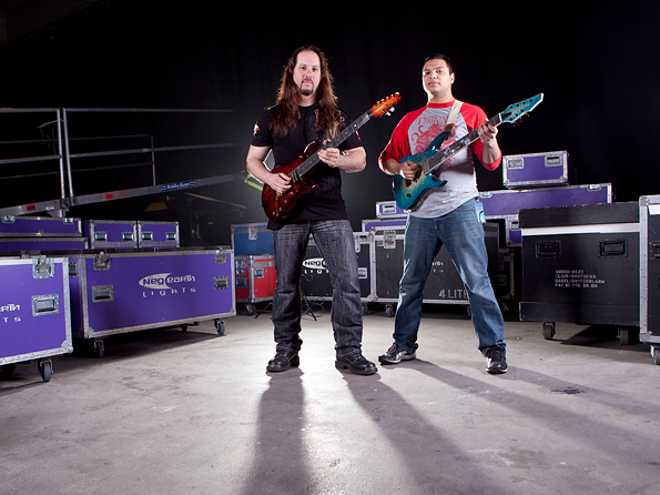
Don't fear the teacher
Not all teachers are boring tank-top fans, some of them are radical, down-with-the-kids guitar-types. As any true virtuoso will tell you, there's no better way to learn than by hanging out with other players - and then stealing their moves.
John Petrucci: “[I went to] Berklee, a jazz school, and I didn’t have a lot of jazz background, so getting into some of the chord melody and improv classes was tough but challenging. The way I visualised it is that your playing goes in steps. You get to a plateau, then something clicks and ‘boom’.”
Misha Mansoor: “I’ve always been the kind of person who says ‘screw the manual’. I’ve tried learning theory a bunch of times and I end up cheating and using my ear. Guitar playing has been a real struggle for me, because I have really bad technique. It’s like the step thing: it feels like I plateau, then the next day for some reason it starts to makes sense. I’d also hang around musicians who are better than I am, because it’s free guitar lessons.”
Buy Total Guitar for iPad, iPhone and iPod (US readers click here)
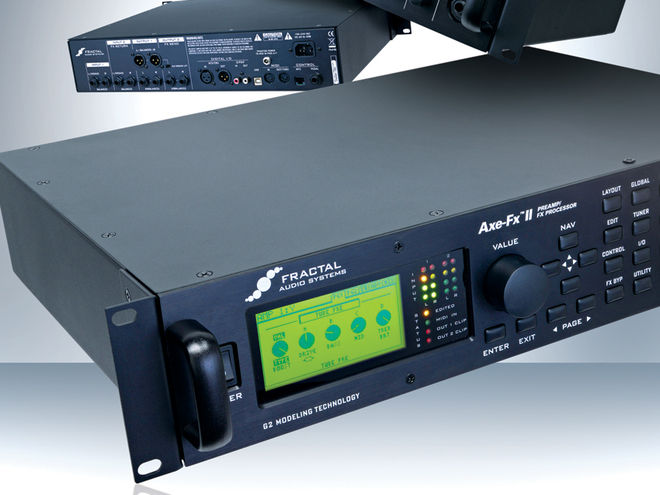
Learn the merits of modelling
John is a valve-amp stalwart, whereas Misha was raised on a diet of home recording software - a modern modelling man, if you will...
Misha Mansoor: “I love amps. I listen to his Mark V tone and think, ‘Ah, maybe I should…’ But for practical purposes, the Axe-Fx is amazing. We didn’t have to rent backline on this tour, we carry our rigs in our carry-ons, we have patch changes controlled by computer – and they’ve never messed up. With my old rigs, you’d hit that standby switch and the sound didn’t come on, and it’s like, ‘What did I mess up?’ Now, it’s very easy to troubleshoot.”
John Petrucci: “I like both schools. I’ve always played amps and I always will. In the studio and live, there’s nothing like the interaction of a guitar cranking through a Boogie. It’s like a drug to me. But the guys at Fractal have come up with an incredible piece of gear that I use in my rig for all the processing effects, my choruses, delays, pitch shifters…”
Read Total Guitar's Fractal Axe-FX II review
Buy Total Guitar for iPad, iPhone and iPod (US readers click here)

Don't be a 4/4 bore
Complex time signatures separate the men from the boys in prog rock, but it's important not to sacrifice groove.
Misha Mansoor: “A huge influence was Meshuggah, and their ability to do seemingly odd time signatures, but really have it all be in 4/4. I love something you can just bob your head to, right? But what I took away from them was that you can get very playful with your beats, accents and syncopation, and make things that are a straight 4/4 sound like they aren’t. I do that a lot. I listened to a lot of Dream Theater!”
John Petrucci: “I was always a big Rush and Yes fan, and it was like, ‘Well, these guys are doing it and it doesn’t always have to be 4/4’. That modulation of meters came naturally to me.
Buy Total Guitar for iPad, iPhone and iPod (US readers click here)
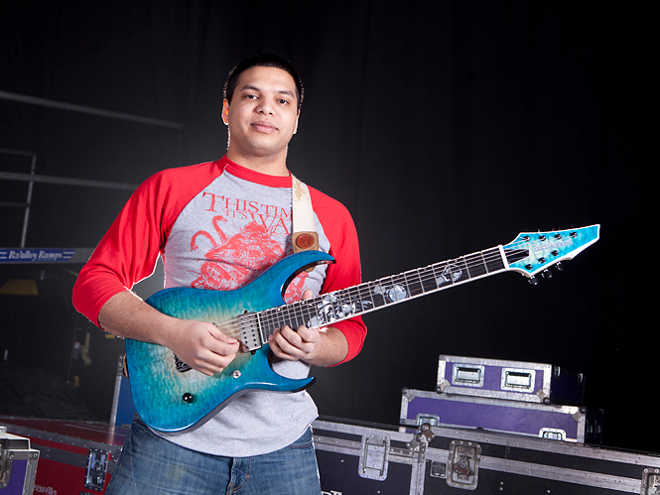
Find your own sound
John Petrucci has developed a distinctive voice on guitar, mainly because his stuff is often nigh-on impossible for us mere mortals to play, but as the Dream Theater man says, finding your own sound isn't just about technique.
John Petrucci: “I love Misha’s sound. It has aggression, but there’s clarity and it has a personality: it sounds like your tone is talking. You know, Periphery has a sound, and I'll show my age here, but I have two 16 year olds and their buddies are so into his style. It’s like you’ve started off a new generation. They’ll say to me, ‘Why can’t you play something like that?’”
Buy Total Guitar for iPad, iPhone and iPod (US readers click here)
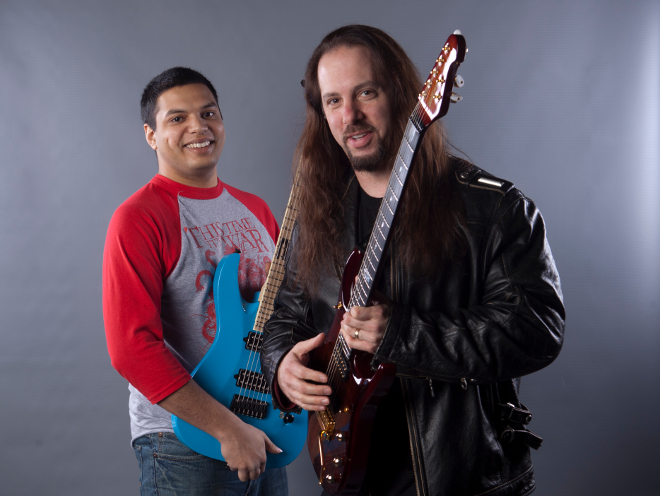
P-p-pick up your picking
Petrucci's alternate picking is the stuff of legends, and although Misha puts himself down by comparison, both players need to have extremely solid right hands to play their unique brands of progressive metal.
John Petrucci: “I come from the school of power picking. Guys like Steve Morse and Al DiMeola were heroes, just the way they seemed so in command of their right and left hand co-ordination, really attacked the strings and ripped through things. It finally clicked when somebody told me what a metronome was.
Misha Mansoor: “I’ve always been rubbish at alternate picking! That was definitely a challenge. This is the master [points to Petrucci]; you can hear the pick attack on every note and it’s always locked in perfectly.”
Buy Total Guitar for iPad, iPhone and iPod (US readers click here)

Master the power of the internets!
Many of the larger progressive bands have a much larger online presence than their equivalents in the mainstream. If you want to spread the word to like-minded people, you'll need to start posting...
John Petrucci: “It’s completely necessary. The music that we’re playing in Periphery and Dream Theater is not the type of thing that gets mainstream exposure. The network of fans all connecting, interchanging, trading stories… it’s essential for bands like ours to spread the word.”
Misha Mansoor: “I’d just post songs online [to SoundClick], and people seemed to dig them and I was always corresponding. Yeah, criticism comes with the territory. It’s a loud minority, and the plain truth is that 99 per cent of these people would never tell you that to your face.”
John Petrucci: “You have to always maintain self-confidence, because if you lose that identity and play into what everybody’s saying, then you’re losing yourself, and the music isn’t gonna have the same conviction… and then you’re done.”
Pick up Total Guitar issue 226, on sale in the US this month, for the full in-depth interview with John Petrucci and Misha Mansoor, plus a special tutorial feature on John’s ultimate warm-up routine.
Buy Total Guitar for iPad, iPhone and iPod (US readers click here)

Total Guitar is Europe's best-selling guitar magazine.
Every month we feature interviews with the biggest names and hottest new acts in guitar land, plus Guest Lessons from the stars.
Finally, our Rocked & Rated section is the place to go for reviews, round-ups and help setting up your guitars and gear.
Subscribe: http://bit.ly/totalguitar
“I’m beyond excited to introduce the next evolution of the MT15”: PRS announces refresh of tube amp lineup with the all-new Archon Classic and a high-gain power-up for the Mark Tremonti lunchbox head
“These guitars travel around the world and they need to be road ready”: Jackson gives Misha Mansoor’s Juggernaut a new lick of paint, an ebony fingerboard and upgrades to stainless steel frets in signature model refresh
“I’m beyond excited to introduce the next evolution of the MT15”: PRS announces refresh of tube amp lineup with the all-new Archon Classic and a high-gain power-up for the Mark Tremonti lunchbox head
“These guitars travel around the world and they need to be road ready”: Jackson gives Misha Mansoor’s Juggernaut a new lick of paint, an ebony fingerboard and upgrades to stainless steel frets in signature model refresh





![PRS Archon Classic and Mark Tremonti MT 15 v2: the newly redesigned tube amps offer a host of new features and tones, with the Alter Bridge guitarist's new lunchbox head [right] featuring the Overdrive channel from his MT 100 head, and there's a half-power switch, too.](https://cdn.mos.cms.futurecdn.net/FD37q5pRLCQDhCpT8y94Zi.jpg)





